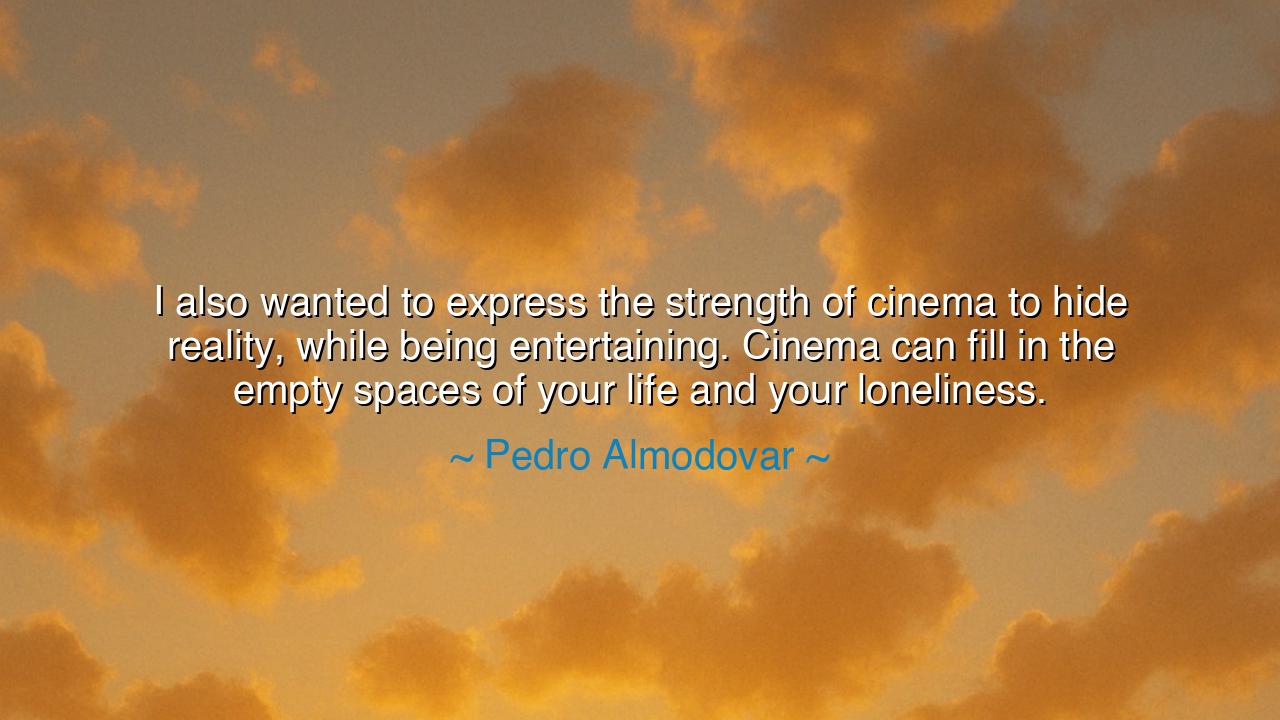
I also wanted to express the strength of cinema to hide reality
I also wanted to express the strength of cinema to hide reality, while being entertaining. Cinema can fill in the empty spaces of your life and your loneliness.






Hear the tender yet profound words of Pedro Almodóvar: “I also wanted to express the strength of cinema to hide reality, while being entertaining. Cinema can fill in the empty spaces of your life and your loneliness.” These words are not merely the reflections of a filmmaker, but a hymn to the power of art itself. For cinema, like the myths of old, is both mirror and veil: it reveals the soul even as it cloaks the harshness of the world. In its light and shadow, men and women find escape, healing, and communion with something greater than themselves.
From the dawn of humanity, we have sought stories to soften the weight of existence. Around the fire, our ancestors told tales of gods and heroes, not only to pass the hours of the night, but to give meaning to suffering, to replace despair with hope, and to knit together lonely souls. In this way, the strength of cinema continues the ancient tradition. Where once there were epics recited, now there are images moving on the screen, yet the purpose remains the same: to soothe, to inspire, to entertain, and to conceal for a time the sorrows of reality.
Think of the people during the Great Depression of the 1930s. The world was heavy with hunger, unemployment, and despair. Yet in the darkened halls of movie theaters, for a few coins, men and women found joy again. Fred Astaire and Ginger Rogers danced across the screen, their elegance dissolving the worries of the audience. For two hours, burdens were lifted, and loneliness gave way to laughter. This is what Almodóvar speaks of: cinema does not erase reality, but it grants the weary heart a refuge, a momentary home against the storm.
Cinema also has the power to fill the empty spaces within us. For when we watch, we do not watch alone. We are joined by the invisible company of others in the theater, and by the unseen community of all who have shared in those same stories. The laughter of one becomes the laughter of all; the tears of one mingle with the tears of strangers. In this way, cinema conquers isolation, making loneliness a shared experience, transforming solitude into belonging.
And yet, Almodóvar’s wisdom is twofold. He does not speak only of escape, but of art’s ability to entertain while protecting us from truths too harsh to bear directly. Just as myth cloaked the chaos of the cosmos in the form of gods, so too cinema cloaks the pain of life in narrative and spectacle. The suffering is not erased, but reshaped into something we can face, something that may even delight as it teaches. Thus, cinema hides reality, but it hides it in order to heal, to give strength, and to make it bearable.
Let this teaching guide you: when life grows heavy, do not despise the gifts of art and story. To take refuge in cinema is not weakness—it is renewal. Just as a warrior rests before returning to battle, so too the soul rests in art before returning to face reality. Let yourself be entertained, let yourself be carried away, for in such journeys, new strength is born.
Therefore, in your own life, seek out the arts that nourish your soul. Watch films not only for distraction, but for communion, for inspiration, for comfort. Share stories with others, for in shared narrative lies shared strength. And remember that in moments of loneliness, you need not walk alone—cinema, like the ancient hearth-fire, gathers all who sit before it into one human family.
Thus is the wisdom of Almodóvar: that in the dance of light and shadow upon the screen, there is power to hide reality, to fill the empty spaces, and to heal the wounds of loneliness. Embrace it, not as escape, but as one of the noble gifts that make life bearable, and in its glow you will find both comfort and courage.






AAdministratorAdministrator
Welcome, honored guests. Please leave a comment, we will respond soon